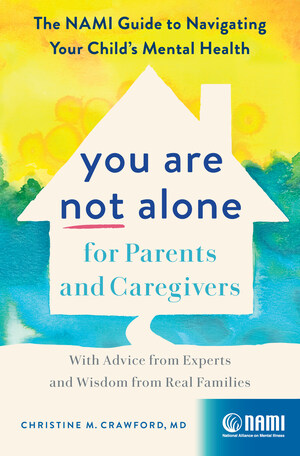ARLINGTON, Va., Oct. 19 /PRNewswire-USNewswire/ -- The National Alliance on Mental Illness (NAMI) charged today that when states cut mental health services, costs often are shifted to law enforcement and corrections systems—with almost 25 percent of inmates in prisons and 20 percent of youth in the juvenile justice living with serious mental illnesses.
(Logo: http://www.newscom.com/cgi-bin/prnh/20100216/NAMILOGO)
(Logo: http://photos.prnewswire.com/prnh/20100216/NAMILOGO)
See Below for State-by-State Data (Adults)
On average, state mental health care systems get only a D grade, in part because of a lack of adequate investment in community services.
Over the past 20 years, state spending on correctional systems has increased 350 percent from $10 billion to $45 billion. High spending on correctional costs are considered one cause of state budget crises.
As Election 2010 enters its final stretch, NAMI has been urging editors, reporters, bloggers and others in a series of special alerts to ask all candidates to address the nation's mental health crisis. (See previous alerts below.)
Here are the facts:
- About two million people with serious mental illness are booked into local jails each year. About 30 percent of female and 15 percent of male inmates in local jails have serious mental illness such as schizophrenia or bipolar disorder. The majority of arrests are for non-violent offenses such as disturbing public order or property offenses. Many have been homeless.
- Seventy percent of youth in the juvenile justice system also experience mental health disorders, with 20 percent experiencing disorders so severe that their ability to function is significantly impaired.
- In prisons, almost 25 percent of inmates live with serious mental illness, but their conditions are often under-treated—or not treated at all. Harsh conditions, including isolation and noise, can "push them over the edge" into acute psychosis. An estimated 70,000 prisoners suffer from psychosis on any given day.
- Fifty percent of people with mental illness who have previously been in prison are rearrested and returned to prison not because they have committed new offenses, but because they have been able to comply with conditions of probation or parole—often because of mental illness.
- In prison, people with mental illness often lose access to Medicare, Medicaid, and Social Security benefits. Even when benefits can be restored upon release, reapplying for can be time-consuming and complex. Without case management and community assistance, individuals with mental illness are at risk of requiring costly emergency medical services or ending up back in prison.
- Based on a comparison of two programs in Illinois and New York, between approximately $20,000 and $40,000 per persons can be saved by providing the mental health care than putting a person in jail.
Adults with Mental Illness in Prison by State;
rounded to 100 (excludes local jails)
Alabama |
7,100 |
|
Alaska |
700 |
|
Arizona |
8,900 |
|
Arkansas |
3,500 |
|
California |
41,400 |
|
Colorado |
5,600 |
|
Connecticut |
3,400 |
|
Delaware |
1,000 |
|
District of Columbia |
NA |
|
Florida |
24,600 |
|
Georgia |
12,600 |
|
Hawaii |
1,000 |
|
Idaho |
1,700 |
|
Illinois |
10,900 |
|
Indiana |
6,800 |
|
Iowa |
2,100 |
|
Kansas |
2,000 |
|
Kentucky |
5,100 |
|
Louisiana |
9,100 |
|
Maine |
500 |
|
Maryland |
5,500 |
|
Massachusetts |
2,400 |
|
Michigan |
11,700 |
|
Minnesota |
2,300 |
|
Mississippi |
5,200 |
|
Missouri |
7,200 |
|
Montana |
900 |
|
Nebraska |
1,100 |
|
Nevada |
3,100 |
|
New Hampshire |
700 |
|
New Jersey |
6,200 |
|
New Mexico |
1,500 |
|
New York |
14,400 |
|
North Carolina |
8,200 |
|
North Dakota |
300 |
|
Ohio |
12,400 |
|
Oklahoma |
5,800 |
|
Oregon |
3,400 |
|
Pennsylvania |
11,800 |
|
Rhode Island |
600 |
|
South Carolina |
5,600 |
|
South Dakota |
800 |
|
Tennessee |
6,500 |
|
Texas |
37,700 |
|
Utah |
1,500 |
|
Vermont |
400 |
|
Virginia |
9,200 |
|
Washington |
4,300 |
|
West Virginia |
1,400 |
|
Wisconsin |
5,100 |
|
Wyoming |
500 |
|
Sources
Sabol, W. J., West, H. C. and Cooper, M., Prisoners in 2008, U.S. Department of Justice, Bureau of Justice Statistics, (2009), and
James, D. and Glaze, L., Mental Health Problems of Prison and Jail Inmates, U.S. Department of Justice, Bureau of Justice Statistics,
(2006).
NAMI Election 2010 Series
Since Labor Day, NAMI has issued as series special alerts to editors, reporters, bloggers and others, encouraging them to ask candidates about the nation's mental health crisis. Are candidates addressing the facts? The series includes state by state data.
Top 10 States; Mental Health Cuts
Number of People w/ Mental Illness; Percent Served by State
Disability Income and State Housing Costs
State Figures: One in 10 Children Lives w/ Mental Illness
Mental Illness: Candidates Are Not Immune
Other Resources
NAMI Fact Sheet: Criminal Justice
Crazy: A Father's Search through America's Mental Health Madness by Pete Earley.
Crazy in America: The Hidden Tragedy of our Criminalized Mentally Ill by Mary Beth Pfeiffer.
Ill-Equipped: U.S. Prisons and Offender with Mental Illness; Human Rights Watch.
About NAMI
NAMI is the nation's largest grassroots mental health organization dedicated to improving the lives of individuals and families affected by mental illness. NAMI has over 1100 state and local affiliates that engage in research, education, support and advocacy. NAMI is a non-partisan, non-profit organization and does not endorse political candidates.
http://twitter.com/namicommunicate
http://www.facebook.com/officialNAMI
SOURCE National Alliance on Mental Illness
WANT YOUR COMPANY'S NEWS FEATURED ON PRNEWSWIRE.COM?
Newsrooms &
Influencers
Digital Media
Outlets
Journalists
Opted In






Share this article